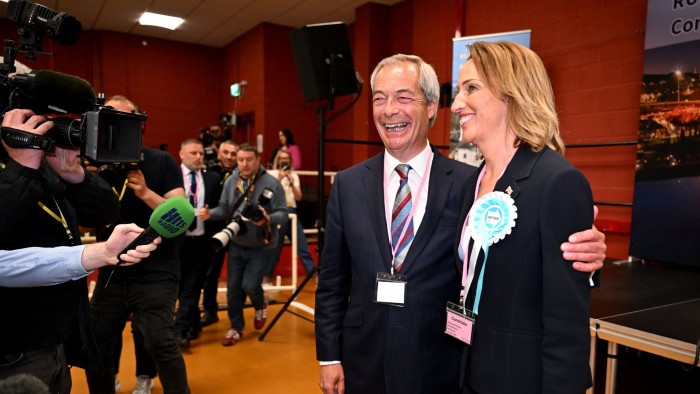This article is an on-site version of our Inside Politics newsletter. Subscribers can sign up here to get the newsletter delivered every weekday. If you’re not a subscriber, you can still receive the newsletter free for 30 days
Labour has lost the Runcorn by-election by six votes, the closest result in a by-election for at least 123 years and certainly the closest in the history of universal suffrage in the UK. It has, at the time of writing, narrowly won the West of England combined authority and the Doncaster mayoralty.
Reform is on course to take control of Staffordshire County Council and has won the Greater Lincolnshire mayoralty. The Conservatives, meanwhile, have suffered losses. The Liberal Democrats and Greens have not really placed yet but their best prospects will declare later on today.
When you have multi-party politics and our first-past-the-post system it becomes about as sensible a way of picking who represents you as using a roulette wheel. I’ll have some more thoughts on the overall picture on Tuesday when everything has declared.
Thank you to the many students, pupils and teachers who came along to yesterday’s Inside Politics event with FT Schools. It was a pleasure meeting you all.
For now, some specific thoughts about Runcorn and whether we really are seeing the end of “two-party politics”.
Inside Politics is edited by Georgina Quach. Follow Stephen on Bluesky and X, and Georgina on Bluesky. Read the previous edition of the newsletter here. Please send gossip, thoughts and feedback to insidepolitics@ft.com
Runcorn echoes the past — but is this time different?
Scores on the door (percentages, not raw votes, as it is vote share change that is worth thinking about in by-elections):
Reform: 38.3 per cent (+20.2 per cent)
Labour 38.3 per cent (-14.7 per cent)
Conservative 7.1 per cent (-8.9 per cent)
Green 7 per cent (+0.6 per cent)
Liberal Democrats 2.9 per cent (-.2.2 per cent)
Runcorn is a familiar story in British politics: an incumbent government that is unpopular experiences a by-election in circumstances that are, to put it mildly, pretty unfortunate. (In case you’ve forgotten, the previous Labour MP punched a guy.)
Looking over at the main opposition party voters have gone “no, thanks” and they’ve reached for a third party. The startling efficiency of the Labour-Liberal Democrat vote has held up, while the Greens, always the most flighty bit of that bloc in the last parliament, have barely moved forward.
In isolation you’d look at this, think back to Liberal Democrat performances against New Labour in the 1990s and 2000s, to performances of the Liberal/SDP alliance against Margaret Thatcher, and you’d go “this is what usually happens when the government of the day is unpopular but the official opposition has not convinced people”. And, historically speaking, you would assume that this is a result which augurs well for the government of the day, because when the actual general election comes around and it stops being a “am I unhappy, y/n?” and “how do I feel about that specific change?” then it would favour the incumbent government.
But there are a couple of reasons to think it might be very different this time. The first is long-term: with the exceptions of 2017 and 2019, when Brexit gave voters a good incentive to polarise, the UK’s long-run electoral trajectory has been towards more parties and more swing voters. We are more fragmented in our private lives and entertainment and therefore it makes sense that we may now be more permanently fragmented in our electoral behaviour.
The second, more short-term trend is the conduct of the Labour government, frankly. It isn’t governing like an administration that is going to react to defeat by sticking to a coherent plan to improve the country and to dismiss minor setbacks as just that. It is almost certainly going to follow a swath of measures that have already increased the costs facing businesses, from their workers’ rights bill to the rise in business taxes, with tightening visa regulations and other measures designed to bring net immigration down. Labour ministers will continue to be timid about the depth and speed of the EU-UK reset, and about the scale of change needed to turn around the UK’s public services and consolidate its public finances. They will continue to be, as Robert Shrimsley writes in his column this week, “in danger of satisfying no one by trying to placate everyone”.
A government with the right agenda and/or a favourable global economic backdrop could and should turn around a result like Runcorn in four years’ time. But given that neither of those things looks likely to turn up any time soon, Nigel Farage may well be right to see this as the next step in his long march to Downing Street.
Now try this
I saw Giant at the Harold Pinter Theatre last night. The play imagines an encounter between Roald Dahl and his publishers, who have made a joint trip to his home to try and persuade him to issue an apology for antisemitic remarks made in a review for Literary Review. It features a stellar cast, but the star in every sense is John Lithgow, who is absolutely mesmerising as Dahl.
Although the meeting between Dahl and his publishers is imagined (and the specific person representing his US publisher entirely invented), every word from both his review and his interview in the second act is verbatim. Michael Coren, who conducted the interview, reflected on that memorably for the New Statesman here, while Sarah Hemming’s review for the FT is here.
Top stories today
-
‘A new dawn’ | Andrea Jenkyns of the Reform UK party hailed a “new dawn in British politics” after a landslide win in Greater Lincolnshire’s first ever mayoral election. “The rebuilding begins here,” the former Conservative MP said after clinching 42 per cent of the vote against the second-placed Tories’ 26.1 per cent.
-
The party starts | Morgan McSweeney, Starmer’s chief of staff, will pore over the results today and is likely to conclude that he is right to pursue a “Blue Labour” strategy to address the populist threat — a policy which is already starting to be deployed. More from our political editor George Parker on Reform’s councillor gains here.
-
Shocking inequalities in health protection | The chances of being admitted to hospital with infectious diseases are dramatically higher in people of certain ethnicities, from particular geographic areas and those living in deprivation, according to the first study of its kind by the UK Health Security Agency.
-
Our Brexit chronicler bows out | Yesterday Peter Foster wrote his last edition of the State of Britain newsletter, formerly titled Britain after Brexit and the Brexit Briefing. Premium subscribers can read his reflection on the UK’s standing in Europe and beyond before Peter heads off to cover world trade in the wake of Donald Trump’s rewiring. But the newsletter (sign up here) will continue under reporters across a range of briefs.
-
Feeling the heat | Two UK university student unions have suspended their Ukrainian societies as they probe if they breached charity rules to buy drones that were later sent to support troops fighting Russian soldiers.






